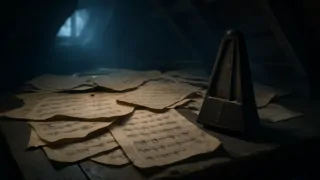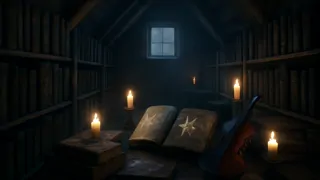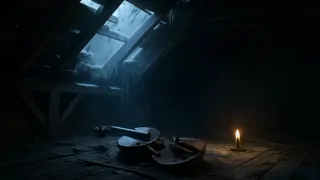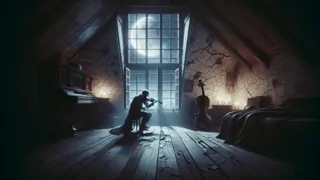Introduction
I first encountered Erich Zann on a bleak autumn evening near the close of the Great War. The gaslit avenues of the Latin Quarter lay shrouded in a damp mist, and I followed a tangled path of crooked alleys until a narrow iron gate revealed an aging four-story mansion at the edge of an abandoned square. A fraying wooden sign declared “Galerie d’Harmonie.” Above a fractured window on the second floor, a single candle burned. Through the murky glass, I glimpsed an emaciated figure, shoulders hunched over a violin-shaped silhouette, swept by flickers of lamplight that danced across his pale features. Drawn by the mournful strain of his playing, I pushed aside the rotting door and ascended a winding staircase that moaned under my weight. At the top, the corridor ended in a vaulted room wallpapered with a mosaic of ghostlike vignettes depicting musicians in cryptic poses. There, seated upon a wingback chair carved with twisted vines, was Zann. His slender fingers coaxed forth a melody of impossible intervals—each note a sharp shard that bent the air and rattled my bones. As the music swelled, I felt the boundaries of reality ripple, and I sensed another realm pressing in behind his strings: a place of shadow and starlight, cradled by a cosmic lament older than time itself. That night, I vowed to understand how a mortal instrument could summon the music of the abyss.
Notes of Dread
Paragraph 1:

In the days that followed, I immersed myself in Zann’s cryptic manuscripts—tall, narrow sheets scrawled with notes that defied musical theory. Each stave twisted upward like gnarled vines, and symbols wavered at the edges of staccato marks. I traced the ink with trembling fingertips, wondering how a man could commit such shapes to memory, let alone play them on a wooden instrument. His handwriting seemed alive: some notes danced away from the staff; others bled into strange hieroglyphs that my mind resisted but could not ignore.
Paragraph 2:
Night after night, I returned to the attic. The narrow corridor walls groaned with wind, but only Zann’s song held me in place. What began as a sorrowful lament deepened into twisted cadences that besieged my reason. Each bow stroke conjured distant echoes of cyclopean chambers and alien architecture—soundscapes that painted impossible geometries in my skull. I felt the air quiver with tension; the fragile ceiling tiles rattled above us in silent response.
Paragraph 3:
Between movements, Zann spoke in hushed whispers: “The music seals the barrier. Without it, they come.” His eyes gleamed with fevered conviction. I pressed him to explain, but he only tapped a dusty metronome and resumed playing. His voice trailed behind the bow, as though pulled through an invisible aperture. I recognized a desperate plea in his tone—a promise and a warning all at once.
Paragraph 4:
One storm-lashed night, thunder rattled the leaded windowpanes and sent shards of water skittering across the floor. Zann’s composition shifted abruptly into a furious allegro, the violin shrieking with overtones that strained the limitations of human hearing. Shadows writhed along the walls, stretching into cavernous mouths that exhaled cold dread. I covered my ears, but the music burrowed into my chest, rattled my heart, and summoned images of cyclopean ruins lit by impossible moons.
Paragraph 5:
When the final chord faded, only an oppressive hush remained. I sank to my knees amid stray pages and snapped bow hair. My pulse drummed in my throat. Zann stared past me, eyes vacant: he had offered his final performance for the sake of containment. In that silence, I sensed as much as heard a distant rumble—an unseen footfall in a hidden corridor of reality. I realized that his violin did more than entertain. It served as a lock and a beacon, holding at bay an ancient force that hungered for our world. “Remember,” he rasped, “never stop the song.”
Shadows Beyond Sound
Paragraph 1:

As autumn deepened, I recognized that nights without Zann’s music left me hollow and haunted. I dreamt of shrieking violins echoing through tunnels of obsidian stone. Each morning, I awoke to an aching void, as if some essential facet of the world had slipped through an unseen crack. The fractured streetlamp outside glimmered on puddles of rain, but neither light nor reality felt true until I centralized myself behind that warped bow.
Paragraph 2:
Desperate to assist Zann, I studied occult treatises and alchemical texts in the Seine-side bibliothèques, seeking clues to his ritual. Manuscripts spoke of “sonic seals” and “resonant wardings” used to bind elder spirits. I learned that certain intervals—augmented fourths and diminished fifths—could tear the veil between planes. Zann’s compositions were not simply music. They were intricate incantations.
Paragraph 3:
One twilight, I confronted him in the flickering half-light of his studio. Shelves bowed under tomes of forbidden lore, and glass jars held dried inks blinking like eyes. With hands stained auburn by pigment, Zann uttered no protest when I inquired about his source. Instead, he pressed two brittle fragments of wood into my palm: shattered violin necks carved with runes. “Each was a sacrifice,” he murmured. “And every torn neck gave birth to this protection.”
Paragraph 4:
At that moment, the floorboards trembled and a low hum rose in the walls. My breath caught as unseen masses pressed at the threshold. I watched Zann’s gaunt figure descend into a trance, bow poised above taut horsehair. He played with a fusion of dread and devotion, his eyes never closing. The notes coalesced into a living barrier: a shimmering dome of sound that crackled against the gathering gloom. I placed my hands on the carved rune of the shattered neck, channeling his vibrations through the artifact. Heat flared along my palms, and the walls seemed to swell outward, propping open a secret door of silence.
Paragraph 5:
When the last echo died, exhaustion seized me. I sank to the floor as thunder rolled overhead. Zann remained motionless, as if drained of flesh and spirit both. For a heartbeat, I believed he had offered up his very soul to sustain the ward. Then—like a candle guttering in the wind—he slumped, his violin loosening in limp fingers. A soft, satisfied smile curved his lips.
Paragraph 6:
We sat in that hush until dawn, two guardians bound by melody and sacrifice. I realized that some music must never cease, not for beauty or art but for the simple act of keeping darkness at bay. Outside, the world continued in oblivion, blind to the peril that might spring forth the moment Zann’s bow fell silent forever.
The Final Crescendo
Paragraph 1:

By winter’s onset, the barrier strained under relentless pressure. Storms battered the city, and winds roared like beasts outside the gabled roof. My nights became a vigil: I sat beside Zann’s frail form, watching his fingers against taut strings as if they were slipping through a keyhole into oblivion. Each note grew more feverish, more desperate, as though fighting to prop the universe upright.
Paragraph 2:
One fateful evening, the attic shook violently. Frost crawled across the windowpanes in filigreed patterns that writhed and pulsed. A sound like distant drums thundered below, and I sensed a terrible awakening beneath the stones of Paris. The walls themselves seemed ready to crack, releasing a darkness cold as deepest space.
Paragraph 3:
Zann did not hesitate. With a cry part lamentation, part triumph, he drove the bow across strings until they blurred in a blaze of silver light. The melody shattered the roof’s gloom, fracturing the storm’s howl into shards of harmony. My vision blurred as primal chords pulsed through my bones; the air blazed with unseen colors. For one sublime moment, I glimpsed a realm of endless twilight, towers aflame with starlight, and silhouettes of beings whose forms outshone galaxies.
Paragraph 4:
Then the strings snapped. A silence more deafening than any roar swallowed the room. Zann collapsed forward, violin and bow clattering to the floor. His final breath exhaled as a single note that hung in the air like a newborn star. I swept up the instrument in trembling hands, fingers brushing the runes etched into the wood.
Paragraph 5:
In the aftermath, the world beyond the attic felt altered—emptier, yet protected. The storm had passed, and the first glimmers of dawn colored the horizon. I descended the stairs alone, violin in hand, to carry on the endless song. For Zann had given his life so that melody might stand as our sentinel. And now, it was my turn to hold the music against the void.
Conclusion
As I ventured back into the waking world, violin strapped to my back and heart heavy with Zann’s legacy, I understood that some melodies carry the weight of eternity. Each dawn I tune the strings to his final composition, and each twilight I draw the bow sharp and true. For every note I play is a promise—to keep the barrier sound, to stave off the creeping silence, and to honor the man who believed that music itself could defy oblivion. In the hush between chords, I still hear his whisper: “Never stop the song.” And so I continue, bound by harmony and dread, the last custodian of Erich Zann’s haunting music.


















